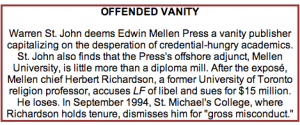For many professionals doing evaluation is part of the job. Lawyers make evaluative judgements about the quality of evidence; teachers judge the quality of students’ learning; builders judge the quality of materials. All work entails judgements of quality, and the quality of work is dependent on doing good evaluations.
But what happens when the evaluation done as part of professional work is contested? You might just find yourself being sued. Such is the case with Dale Askey, librarian at McMaster University. Askey’s job requires him to make judgements about the quality of published works and in turn publishers to make wise procurement decisions for his employer, decisions that have become ever more difficult with shrinking resources. The case can be easily summarized:
Librarian questions quality of a publishing house.
Librarian publicly criticizes said press on his personal blog.
Two years later, librarian and current employer get sued for libel and damages in excess of $4 million.
Read more: http://www.insidehighered.com/news/2013/02/08/academic-press-sues-librarian-raising-issues-academic-freedom#ixzz2MDEYx2An
Inside Higher Ed
There is no reason to believe that Askey rendered his judgement about the quality of scholarship offered by Mellen Press in a capricious or incompetent manner. Making judgements for procurement decisions is surely one of the tasks that Askey’s employer expects him to do, especially in a time of diminishing resources.
There has been considerable support for Askey, some a bit misguided by defending his write to express his opinion on his blog, but most in defense of Askey’s responsibility to do his job.
 There is every reason to expect that the Mellen Press lawsuit will be dismissed as was the similar lawsuit brought by Mellen Press against Lingua Franca.
There is every reason to expect that the Mellen Press lawsuit will be dismissed as was the similar lawsuit brought by Mellen Press against Lingua Franca.
So what is the relevance for evaluation? It is clear that evaluation is integral to all and applied in virtually all other intellectual and practical domains… it is as Michael Scriven claims, a trans-discipline. As such, there is a need to pay more attention in preparing people to do publicly defensible evaluations in the context of their work. Perhaps more than program evaluation, this sort of evaluative thinking might be the raison d’etre for the discipline of evaluation.
 Follow
Follow
